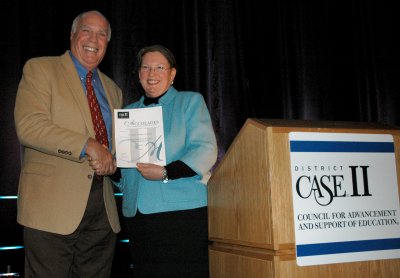
Marc Apter, associate vice president for marketing and public relations at St. Mary’s College of Maryland, receives the Council for the Advancement and Support of Education silver award for the college’s Race Relations Study Circles program from Anne Berry, vice president for advancement at Lebanon Valley College. (Photo: Dave Jackson, ActionImages Photography)
ST. MARY’S CITY, Md. (April 21, 2010) — The Council for Advancement and Support of Education (CASE) recently announced that St. Mary’s College of Maryland (SMCM) won the Silver award in the Community Relations Programs category for the 2010 CASE II Accolades Awards. The submission highlighted SMCM’s sixth annual Martin Luther King, Jr., Prayer Breakfast, as well as the Community Race Relations Study Circles. The prayer breakfast has become a revered annual tradition in St. Mary’s County, bringing more than 350 community members to the January 2010 breakfast. The Study Circles were started in the third year of the prayer breakfast to provide year-round programs in race relations in St. Mary’s County. In 2009, the college used the program internally to look at race relations at the college itself, and to make recommendations to the administration for improvement.
In accepting the award, Marc Apter, the college’s associate vice president for marketing and public relations, said “The college brought the local Board of Education and county Human Relations Commission into the Race Relations Study Circles. By working with these important agencies within St. Mary’s County, we are able to expand our collective impact toward solving local race relations issues.”
The MLK Breakfast has brought in well-known faces, such as House Majority Leader Steny Hoyer; NAACP activist Janice Talbert Walthour; Bill Yoast, the coach who helped inspire the blockbuster hit movie “Remember the Titans;” and national civil rights leader the Rev. Walter Fauntroy. It is held at the college, and students, faculty, staff, and community members are all invited to attend. Information is distributed at the start of the breakfast regarding the Study Circles, inviting the audience to participate.
The purpose of the Study Circles is to promote discussion among county and college community members about shared concerns, experiences, and suggestions on race relations. The groups address the effects of inequities in education, employment, and lifestyle. Study Circle teams include residents from varied backgrounds and are guided by trained and experienced facilitators. They conduct purposeful discussions and propose specific suggestions for change to be brought to the attention of county and college leadership.
“This was a great program that created not only campus-community unity but also involved the public using impressive promotion and media placements,” said CASE host judge Melissa Connolly, vice president of university relations at Hofstra University. “It was very well done,” she concluded.
The largest of the eight CASE districts, District II helps members build stronger relationships with their alumni and donors, raise funds for campus projects, produce recruitment materials, market their institutions to prospective students, diversify the profession, and foster public support of education.


